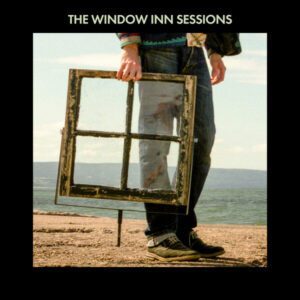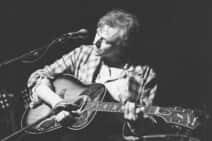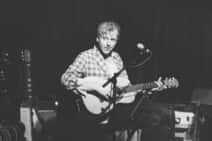The first time that Joel Plaskett played in Philadelphia was 1995 when the barely out of his teens Plaskett opened up for the Toadies at the Trocadero along with his former band Thrush Hermit. The band went their separate ways in 1999 and the years since has seen Plaskett seen a good amount of success as a solo artist. However, his star has burned brighter in his native Canada than it has in the United States. So on his most recent swing through the City of Brotherly Love, the Nova Scotia born and based singer-songwriter played to a crowd in World Café Live’s Upstairs room on a Tuesday night that was significantly smaller, but no less excited to see him.
Joel Plaskett has a dominating presence on a smaller stage, in part due to his years on the road and in part because his tall, lanky figure is impossible to ignore. At the same time, he possesses a quick smile and an affable demeanor, both of which I would become acquainted with later in the evening. “We rolled into town and they were playing Husker Du on the radio, so I knew that I’d be starting with this song.” Armed with only a tenor guitar and the presence culled and refined from years on the road, Plaskett launched into “You’re Mine” from his most recent album Scrappy Happiness with the chorus The skies will turn from pink to blue, the years will turn to sand/The needles drop on Husker Du, they were my favorite band.
Plaskett is the consummate showman in a fairly understated sort of way. While he never got too long-winded, the well-placed quip here and comments on the song prior or forthcoming there were entertaining and by themselves almost worth the ticket price. Almost everything he hit on his setlist seemed to have an interesting story behind it, from “Through & Through & Through” (“Randy Bachman [of BTO fame] did a show on his national radio show where he featured songs with stutters in them, and I’m pissed that he didn’t include this one”) to “North Star” (I wanted to write a song in celebration of a truck and a man in a truck that rolled 500,000km. It’s not totally autobiographical, but imagine if the guy from the Big Lebowski inhabited my body for a week”) to “Harbour Boys” (“I may have inadvertently stolen the chorus from some guy in Ireland, so when the lawsuit appears on my desk I won’t be surprised”)
The show itself was great, as Plaskett and touring mate Peter Elkas leaned heavily on material from the albums Three and Scappy Happiness, and appeared to have a good time in the process. When I sat down with him after the show I brought up the fact that it’s sometimes challenging to describe the music to people who are unfamiliar with his work, since hanging the term “Canadian Indie Rock” really doesn’t pay him any justice. Instead, I mentioned that I defined his songs as striking a balance between cheerful cynicism and wistful nostalgia.
“Sure I’ll roll with that,” he chuckled. I mean, I leave it to somebody else to tell me what I do. I just like songs and I like melodies and I care about words a lot. It’s lyrical rock and roll, and it certainly comes from an indie sort of 90s aesthetic that I’ve carried with me my whole life because that’s the area I come out of. I think part of it is lyrics-based, so it’s not always the easiest thing to describe because it changes stylistically. But the approach to the words stays consistent, even when maybe stylistically or sonically it’s changing a little bit.”
Over last decade, Plaskett has hit his stride as an artist, riding a recording winning streak that extends back to 2005’s La De Da. In the albums that have followed: 2007’s Ashtray Rock, 2009’s Three, and now 2012’s Scrappy Happiness Plaskett has transformed himself into a well-respected songwriter with an almost maniacally mechanical proliferation. If he isn’t recording then he’s touring, or he’s helping other artists either by playing on producing their own albums. As I sat down with him after the show, this fact was brought front and center when I asked him if he ever got a chance to sleep.
“Yeah,” he laughed, “but when I’m not I’m thinking. It’s a busy few years for sure. I don’t sit idle very easily when it comes to that. I run hot, you know what I mean? But I’ve been kind of fooled by an audience that cares, so knowing that there’s people listening makes a difference.”
In 2009 he released Three, a triple album that he recorded when he was 33 years old that originally was supposed to consist of three 11-song discs and ended up at a slightly more manageable 9 apiece. In his own words, “I got a little carried away”. It was Three that firmly entrenched his legacy in the Canadian music scene, having earned him a Juno award (sometimes called the ‘Canadian Grammys’) for best Adult Alternative Album, but it also left him with the problem of trying to follow it up. I asked him if this was the reason that he chose to take an entirely different direction with his latest album.
Joel: “How do I do follow up a record that was well received? You know, I won a Juno for it, and it built my audience. But it was also a triple, how do I follow that? Well then I gotta just do it. I don’t need it to be the perfect record, because I can toil over 10 songs for 2 years to figure out if it’s going to be a worthy follow up to a well-received triple. The only way to get out of that was to just make something, and I thought if I have a parameter to that, which is just do, a song a week, go”, then it’s a way to respond to that record and get out from under its shadow.”
This is where Scrappy Happiness enters the picture, an album that is centered around the idea of, as Joel said from the stage, “trying to find some happiness amidst the scrappiness of life.” Recorded over the course of ten weeks in January through March of 2012, each song was recorded, mixed, mastered, and released per week before being pulled together to create one succinct collection, the idea for which he came to after crafting a song for the CBC.
“I recorded one song for the CBC called “On the Rail” that they commissioned me to write about the Cabot Trail,” he said, referring to his entry in CBC Radio 2’s 2009 Great Canadian Song Quest. “It came out, I delivered the master to CBC and they played it on the radio the next day. And I was like, ‘damn that was cool, I just finished it yesterday and now it’s on the radio’. That turnaround was inspiring, so I thought ‘well how do I do something fast?’”
On its surface, the idea of recording a song a week each week for ten consecutive weeks sounds at best daunting and at its worst crazy, but Joel did make the point that the time frame is more of an illusion than anything.
“We have a week, and that’s plenty of time to make a song. It was stressful but it was plenty of time. Ten weeks on an album? That’s a long time to spend on a record, you know what I mean? It’s weird to have a deadline every week, but that’s actually a long time to spend.”
I had read previously that Plaskett had all ten of these songs written before the ten week recording period commenced, but I asked him to what extent these songs were formulated or if they had done any kind of prerecording or demoing beforehand.
“We had jammed some of these songs live, so I had a little bit of a vision of what I thought would work. But I always find that you have this idea of what you think would sound good on your arrangements, and then you put mics up and you’re like ‘Okay, if I play a little differently this sounds better.’ So you just tweak and everything just kind of takes a new path. Part of the reason why I did it that way, and I was like ‘let’s just release these as we go’ is that sometimes you end up chasing demos: and you make a demo and you think the demo’s awesome. And then you record it again and it’s not as good, or it doesn’t have the same mojo. So I was like ‘let’s just make hi-fi demos: let’s make the first kick at the can the shit that we put out’ as opposed to recording some lo-fi version of something and hopefully make it better. But maybe don’t capture the magic again because you’re chasing some sort of alchemy that existed the first time you did it.”
After we paused for a few minutes while the venue settled up with him, I asked Joel if the limited time and perpetual deadlines affected the sonic decisions he made on the album.
“I think it leaves happy accidents,” he surmised. “There are definitely some concessions I may have made. I probably would improve or have spent maybe some more time on some of the mixes if I wasn’t right down to the wire on a couple of them. They really only affected a few songs which came quite down to the wire. But you want to put your best foot forward, but sometimes you don’t know what that is. Sometimes your best foot is just moving forward. A lot of the records I like were done quickly or a series of singles almost. Like rather than get hung up on whether the mix is perfect, I care about the songs, I care about the words. I just felt like the story is in the imperfections; let them be what they are.”
Considering the way that the album was conceived and executed, I wondered whether or not there were any songs that surprised him when all was said and done.
“I really didn’t know what “Somewhere Else” was going to be, I had it as a fragment, and I really kinda liked how that turned out. It’s short and zeppy and cool.”
“Somewhere Else” possesses an identity that at first listen feels heavily indebted to 1980s Australian jangly pop of groups like The Church and the Go-Betweens, but when you submerse yourself in it you realize it accomplishes this without sounding overly derivative or cliché.
“I think the underdog on the record for me, one of the most meaningful songs I’ve ever written is a song called “Old Friends”. Nobody ever points it out, I don’t do it live much, it’s slow, it doesn’t really always have a place in the live show. But the words mean a lot to me. I think “Lightning Bolt” is the mission statement: “Lightning Bolt” is what the record’s about, but “Old Friends” is probably lyrically the closest to my heart.”
“Old Friends” is a heck of a song, meticulous and methodical song, but I would be hard pressed to call it slow. It takes some time to get where it’s going, but it’s like driving on a smaller two-lane highway as opposed to taking the interstate: once you get where it’s going you’re glad that it proceeded the way that it did. It ends up as a deceptively crashing amalgam of sound that is equally touching as it is sonically pleasing. But it did remind me of the many past instances where I have championed songs that were slower paced and more personal in nature. The unfortunate part about music is that you have to be more mentally and emotionally invested in order to appreciate songs like this, and I would watch as other people refused to develop that kind of connection and watch as these songs foundered and died on the vine. When I mentioned this to him, he again took it all in stride.
“What I hear in my music and what other people hear is different and it should be different,” Joel said. “I don’t expect people to get the nuances I put into it. I just know what they mean to me, and part of the reason I make records the way I do is so that I have a memory on which to hang the record in my own mind. You spend all this time toiling over stuff, and I care about sounds and I spend time on stuff, but I want to hear joy on records. And even if it’s the saddest song I ever wrote, I want to put it down in a way that’s meaningful to me and I want to have a memory of making it in a place and in a time.
And this is my issue with a lot of current recordings where you can drop samples on stuff and you can make anything sound like anything anywhere because you can quantize and sound replace and do all of this shit. But I just want to make a record that sounds like someplace, sometime in my mind. Even if no one else does, I have this association with the song meaning a lot to me in a time and a place. And if I have that, then I can move forward with this feeling of I did my job and also represented myself and I have a memory of making a cool record or a cool song in a time and a place. It’s not some sort of like vague, computer universe where you perfect things over a year. It’s like ‘no, I did this at this specific time’ so that’s why I make my records in the way that I do…so that they feel like moments, as opposed to like…they could be anything, anywhere, anytime. I love Neil Young for the reasons in which he believes in a place and a time, and he does it far more like live off the floor than I do.”
I asked him if he was surprised with where his career arc has taken him, or if he pictured himself ending up in this position after Thrush Hermit disbanded.
“It’s not that different,” he said, after thinking about the question for a few moments. “It’s all an extension of the same thing. I’ve had some really great things happen, I work with my head down and every once in a while I’ll look up and I go ‘hey, I haven’t been here before’ or ‘wow a really cool thing just happened’. There are some really great things that have happened over the years. But at the same time people don’t know me down here. The thing that I’ve realized about playing and touring is that you’ve got to do it because you love it. And also, the game doesn’t change”
“I like the idea of getting down to the United States and making fans here, but I’m also realistic that I’m not a young guy anymore and it’s going to be like a cult or those in the know. And I don’t harbor any ill feelings about that, I’m pretty realistic about it. I take a lot of pride in what I do, and I like the idea that if you make good music at some point Mojo’s going to need to dig into some version of what was cool in the 1990s or the 2000s and they’re going to stumble upon what I did. Even if it’s kind of esoteric or regional, and only from a certain corner of the world where I’ve had a bit of success: the Maritimes, Canada to a certain extent but the Maritimes. And perhaps that at some point internationally there’s going to be a handful of people who’ve banded through the revisionist universe that the internet and magazines inhabit. Where at some point, we can only write so much about the Beatles, let’s go find something that happened 20 years later or 30 years later and write about that. And I like to think that I’m contributing something to that universe.”
“My whole adult life has been that of a musician and I don’t see it changing. Whether I’m physically successful in terms of like drawing a bunch of people or monetizing it in some way, it doesn’t really matter. I care about the art. I like the idea of being able to make a living from it and I have been, I’m super fortunate. There are a lot of people that I admire that haven’t had the opportunities that I’ve had, so I don’t in any way feel unlucky. I’d love to reach more people but I feel really blessed.”
“I’m 37 and I’ve literally lived the Life of Reilly. I’ve been standing here in a suspended adolescence touring, playing, coming to different places and even when I’m not drawing a lot of people I have opportunities. That the world is my oyster. It’s not the same as the Arcade Fire: the world is the Arcade Fire’s oyster. But at the same time with a huge success comes great responsibility, and great recognition, and you enter some sort of prison that fame inhabits as well. You could be famous, and you have all these other opportunities and all these things open up to you, then you’re also in prison because you can’t do the things that are small anymore. So you trade one universe for the other.”
“It’s a pick your poison scenario,” I suggested.
“Yeah right. So you have to decide whether you like the world that you inhabit or not. I’m always striving to reach other people but at the same time I don’t like the idea of being famous. To me, that’s prison. I want success on my own terms.”
“It’s fame without being famous,” I offered.
“Yeah I want success on my own terms so I strive to find that. And I continue to do it. I just recognize it for what it is. And I pick my battles. I really care about my family and my hometown and my friends and I recognize as I get older that my desire to be on the road decreases a little bit. But my idea to make good art doesn’t. I don’t know if it will always be from the stage but I think that I’m still driven to write songs and present them in a way that I take some pride in.”
Joel Plaskett is an indie rock classicist, in the sense that there is a timeless feel to the songs that he creates. It might be because of his pedigree in the music industry, it might be because of the way he goes about his craft, the personal touch that goes into his songwriting and performing. The answer I think lies somewhere in the intersection of all of those. Either way, on a brisk, clear, Tuesday night in Philadelphia there was something very comforting about him as an artist, and as a result something very appealing about that idea of finding a little happiness in the scrappy things of life. -Chris Kubak
***************
Other notes: The show opener was Philly artist Ron Gallo, who has started to make a name for himself fronting a band called Toy Soldiers that most regulars in the Philadelphia bar/club scene are familiar with. However on this night he flew solo, armed with a nylon string acoustic guitar and a harmonica, his own material a bit different from that of his band. His style is best defined as a cross between the bluesy singer-songwriter moments of Justin Townes Earle, the troubadour leanings of Dustin Kensrue’s solo works, and the edgy whimsy of Roger Miller. He mixed in a few appropriately chosen covers of the Coasters’ “High Roller Baby” and Harry Nilsson’s “Early in the Morning.”
Joel Plaskett’s Set List, World Café Live Philadelphia 3/19/13
You’re Mine
When I Go
Through & Through & Through
You Let Me Down
Every Time You Leave
One Look
Rollin’, Rollin,’ Rollin’
I’m Yours
North Star
Harbour Boys
Love This Town
Deny, Deny, Deny
Lonely Love
Nowhere With You
Wishful Thinking
by Striker Bill




